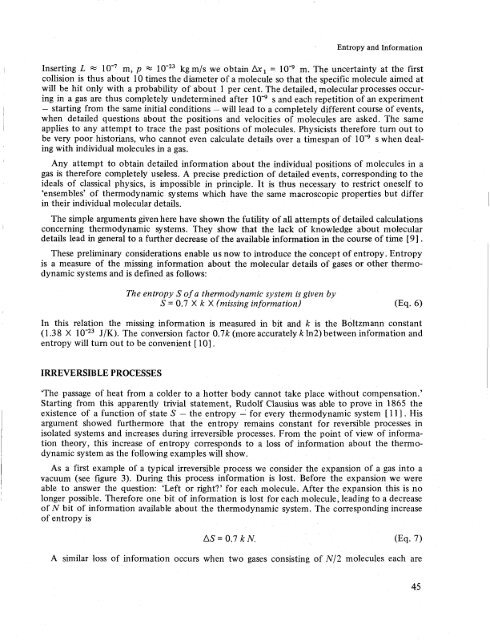New trends in physics teaching, v.4; The ... - unesdoc - Unesco
New trends in physics teaching, v.4; The ... - unesdoc - Unesco
New trends in physics teaching, v.4; The ... - unesdoc - Unesco
Create successful ePaper yourself
Turn your PDF publications into a flip-book with our unique Google optimized e-Paper software.
Entropy and Information<br />
Insert<strong>in</strong>g L X lo-’ m, p % kg m/s we obta<strong>in</strong> Axl = 10- m. <strong>The</strong> uncerta<strong>in</strong>ty at the first<br />
collision is thus about 10 times the diameter of a molecule so that the specific molecule aimed at<br />
wilI be hit only with a probability of about 1 per cent. <strong>The</strong> detailed, molecular processes occur<strong>in</strong>g<br />
<strong>in</strong> a gas are thus CO etely undeterm<strong>in</strong>ed after lom9 s and each repetition of an experiment<br />
- start<strong>in</strong>g from the same <strong>in</strong>itial conditions - wil lead to a completely different course of events,<br />
when detailed questions about the positions and velocities of molecules are asked. <strong>The</strong> same<br />
applies to any attempt to trace the past positions of molecules. Physicists therefore turn out to<br />
be very poor historians, who cannot even calculate details over a timespan of s when deal<strong>in</strong>g<br />
with <strong>in</strong>dividual molecules <strong>in</strong> a gas.<br />
Any attempt to obta<strong>in</strong> detailed <strong>in</strong>formation about the <strong>in</strong>dividual positions of molecules <strong>in</strong> a<br />
gas is therefore completely useless. A precise prediction of detailed events, correspond<strong>in</strong>g to the<br />
ideals of classical <strong>physics</strong>, is impossible <strong>in</strong> pr<strong>in</strong>ciple. It is thus necessary to restrict oneself to<br />
‘ensembles’ of thermodynamic systems which have the same macroscopic properties but differ<br />
<strong>in</strong> their <strong>in</strong>dividual molecular details.<br />
<strong>The</strong> simple arguments given here have shown the futility of all attempts of detailed calculations<br />
concern<strong>in</strong>g thermodynamic systems. <strong>The</strong>y show that the lack of knowledge about molecular<br />
details lead <strong>in</strong> general to a further decrease of the available <strong>in</strong>formation <strong>in</strong> the course of time [91 .<br />
<strong>The</strong>se prelim<strong>in</strong>ary considerations enable us now to <strong>in</strong>troduce the concept of entropy. Entropy<br />
is a measure of the miss<strong>in</strong>g <strong>in</strong>formation about the molecular details of gases or other thermodynamic<br />
systems and is def<strong>in</strong>ed as follows:<br />
<strong>The</strong> entropy S of a thermodynamic system is given by<br />
S = 0.7 X k X (miss<strong>in</strong>g <strong>in</strong>formation) (Eq. 6)<br />
In this relation the miss<strong>in</strong>g <strong>in</strong>formation is measured <strong>in</strong> bit and k is the Boltzmann constant<br />
(1.38 X J/K). <strong>The</strong> conversion factor 0.7k (more accurately k ln2) between <strong>in</strong>formation and<br />
entropy wil turn out to be convenient [ lo].<br />
IRREVERSIBLE PROCESSES<br />
I<br />
I<br />
‘<strong>The</strong> passage of heat from a colder to a hotter body cannot take place without compensation.’<br />
Start<strong>in</strong>g from this apparently trivial statement, Rudolf Clausius was able to prove <strong>in</strong> 1865 the<br />
existence of a function of state S - the entropy - for every thermodynamic system [ 11 I . His<br />
argument showed furthermore that the entropy rema<strong>in</strong>s constant for reversible processes <strong>in</strong><br />
isolated systems and <strong>in</strong>creases dur<strong>in</strong>g irreversible processes. From the po<strong>in</strong>t of view of <strong>in</strong>formation<br />
theory, this <strong>in</strong>crease of entropy corresponds to a loss of <strong>in</strong>formation about the thermodynamic<br />
system as the follow<strong>in</strong>g examples wil show.<br />
As a first example of a typical irreversible process we consider the expansion of a gas <strong>in</strong>to a<br />
vacuum (see figure 3). Dur<strong>in</strong>g this process <strong>in</strong>formation is lost. Before the expansion we were<br />
able to answer the question: ‘Left or right?’ for each molecule. After the expansion this is no<br />
longer possible. <strong>The</strong>refore one bit of <strong>in</strong>formation is lost for each molecule, lead<strong>in</strong>g to a decrease<br />
of N bit of <strong>in</strong>formation available about the thermodynamic system. <strong>The</strong> correspond<strong>in</strong>g <strong>in</strong>crease<br />
of entropy is<br />
AS = 0.7 k N. 0%. 7)<br />
A similar loss of <strong>in</strong>formation occurs when two gases consist<strong>in</strong>g of N/2 molecules each are<br />
45
















